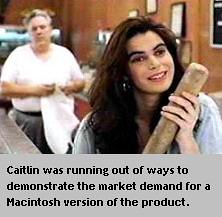Swearing in public

I’m growing fond of Twitter, particularly since it’s a great tool for overhearing what’s on the minds of people involved in a particular line of work–including, oh, say, product management. This morning, I followed a Twitter-posted link to Brian Lawley’s “Product Management Manifesto.” If future historians wanted to learn about the product management profession, both the good and the bad, the Manifesto might be a key piece of evidence.
That’s not a good thing. The “Manifesto” may reflect the current state of product management, but it’s a bad manifesto.
What Is And Isn’t A Manifesto
For people reading this blog, the word manifesto probably conjures up two main examples, Agile and Communist. In both cases, the manifesto is intended to be a plan for collective action. Today, we follow a long-term development plan. Tomorrow, we start using a more adaptive process. Today, we work on the assembly and hope our lives will improve will get better. Tomorrow, we march on the factory owner’s office, or the tsar’s Winter Palace.
The “Product Management Manifesto” is really a personal oath. Statements like, “I refuse to settle for mediocrity,” or, “I believe that Product Management is one of the toughest, yet most rewarding jobs in the world,” sound more like personal statements of dedication, bordering on professions of belief.
Here’s some text excerpted from some other oaths, just to drive home the point further:
- “On my honor, I will do my best to do my duty to God and my country, and to obey the Scout Law.” (The US version of the Boy Scout Oath.)
- “Thirdly, I believe with equally firm faith that the Church, the guardian and teacher of the revealed word, was personally instituted by the real and historical Christ when he lived among us, and that the Church was built upon Peter, the prince of the apostolic hierarchy, and his successors for the duration of time.” (From Pope Pius’ Oath Against Modernism.)
- “It is right that those who offer to us unbroken fidelity should be protected by our aid.” (Typical language from a feudal oath.)
- “Be tasteless, rude, and offensive / Live in a swamp and be three dimensional / Put a live chicken in your underwear / Get all excited and go to a yawning festival.” (Steve Martin, “The Grandmother Song.” I added it to see if you were still paying attention.)

Doing More Harm Than Good?
So what’s the harm in having a product management oath? Perhaps nothing. On the other hand, it may reinforce the weakness and ambiguity of product management in many technology companies.
The word “manifesto” drips with political connotation. That’s good, in a product management context, because product management is inherently political. Product managers are persuaders, by necessity. Product managers also find themselves in the thick of nasty political struggles. The politics of product development are sometimes structural and unavoidable, such as the persistent tension between development teams and salespeople over the promised contents of the next release. Others are somewhat avoidable, but all too common, such as the power struggles that erupt between SPITRs and product managers over who really knows which features are really important.
However, it’s bad to raise the expectations of resolving a political problem, only to retreat immediately into personal declarations of good intentions and right actions. The problems with product management today are not personal, but institutional. There’s no point in swearing to “further my professional status by attending training courses, becoming certified and reading books, blogs, and newsletters to learn best practices,” if my employer wont’ pay for classes that will help me hone my PM skills.
In fact, some of the elements of the “Manifesto” border on self-loathing. I haven’t met a product manager who didn’t want to be “an expert in all areas regarding my products.” The problem, of course, is finding the time, when you’re already racing to answer the latest urgent request from Sales or Support, or you’re spending way too much time in meetings. What’s the point, therefore, of swearing to do something that you already think is important, other but you don’t really have a good chance of doing it? Unless, of course, you need to remind yourself, like a medieval flagellant, of how lowly and wretched you really are.
Implicitly, oaths state an individual’s subservience to a particular organization or creed. I swear to you, the Grand Master of the Knights Templar, the country in which I am about to become a citizen, or the Cub Scouts of America, that I will loyally comply with your principles, laws, and directives. In contrast, product managers don’t need to swear undying fealty as a subordinates. They do need to establish a stronger, clearer role within technology companies.
Perhaps the product management profession needs a manifesto. (“A spectre is haunting the technology industry–the spectre of bad product decisions.”) Unfortunately, this particular “Manifesto” ain’t it.